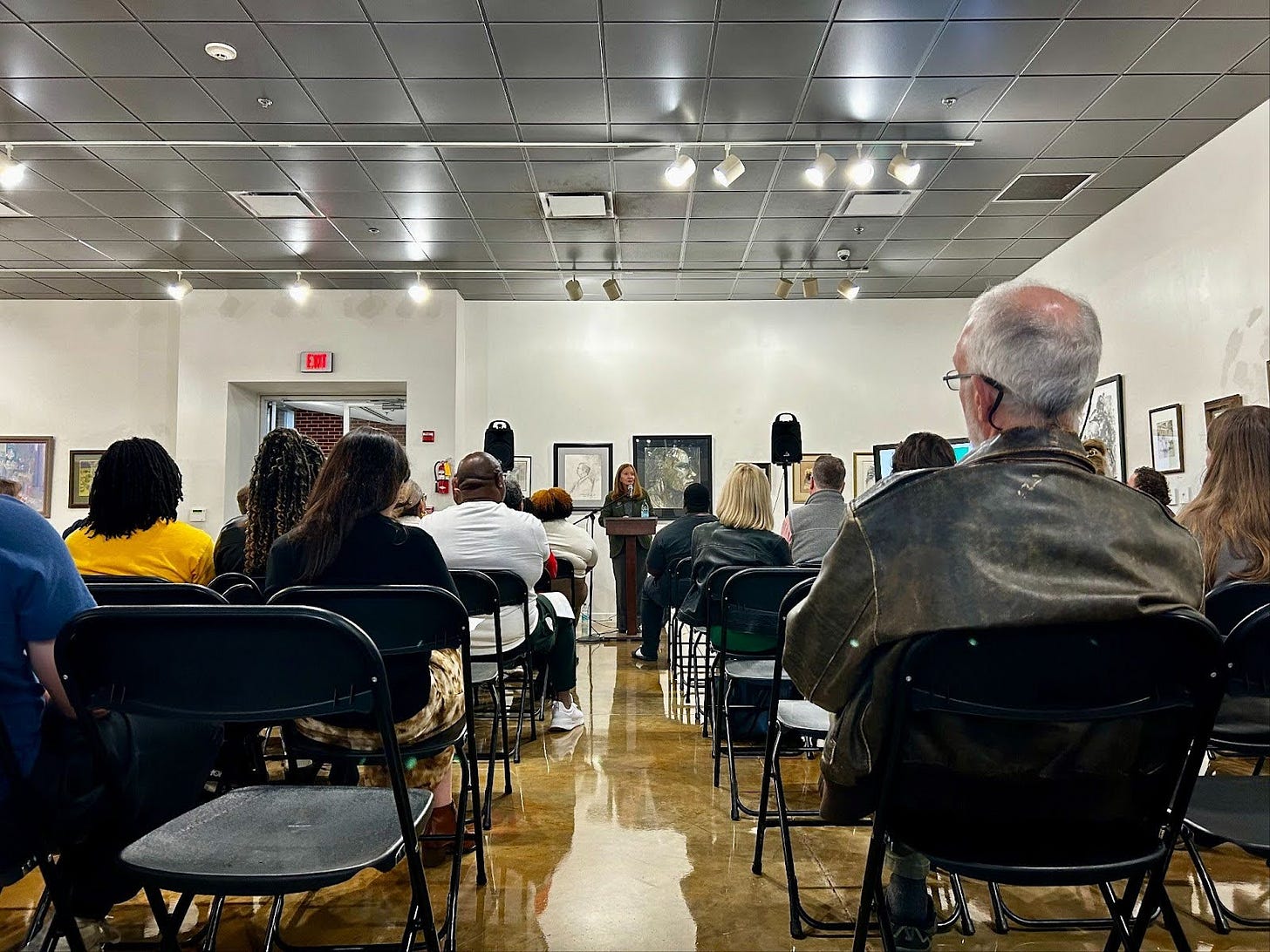MS Author Ellen Ann Fentress Gives Lipsey Lecture
The memoirist and documentarian delivered the 48th Lipsey Lecture on the importance of truthful storytelling.
On Monday, October 21, the 48th annual Lipsey Lecture took place at the Gore Arts Gallery in the Leland Speed Library at Mississippi College. The speaker for this year’s lecture was author, documentarian, and Mississippi College 1978 alumna Ellen Ann Fentress. The lecture was titled “The Stories That Are Ours To Write.”
Fentress’s past work includes “Eyes on Mississippi,” a documentary on civil rights journalist Bill Minor, and her recent memoir, “The Steps We Take: A Memoir on Southern Reckoning.” Fentress currently teaches creative writing at the Mississippi University for Women.
“[The Steps We Take] began as different essays I had published on different subjects that sort of added up to a portrait of my life,” Fentress said. “Then, I wrote some new material, and it came together as a memoir.”
Alongside the Lipsey Lecture, a photography exhibition, titled “May 1970: The Gibbs-Green Tragedy at Jackson State College, through November 9th,” was also held in the gallery.
“What an exhibit,” Fentress commented. “Dr. Derby’s work is so important. Talking about telling stories in our iconic spaces and telling stories that we have to record or document… what a force to tell these iconic stories.”
The Sue Price Lipsey Lectureship, formerly known as the Mississippi College Humanities Lectureship, was established in September 1971. The title of the lecture series changed in 1974 in honor of Sue Price Lipsey’s years of service to Mississippi College. The lecture series allows students to be able to learn about academic subjects in the humanities beyond an in-class lecture.
The Lipsey Lecture and the African American Studies program partnered to produce this year’s lecture. Director of the African American Studies program and Department of History Associate Professor Dr. Christian Pinnen mentioned that the partnership between the Lipsey Lecture and AAS was organic. “[The histories of MC and Jackson are] always connected to African American history or studies one way or another,” Pinnen said.
At 6 o’clock, the program opened with welcome remarks by English professor Dr. Steven Price, followed by opening remarks by English and Philosophy department chair Dr. Kristi Melancon. Then, senior Sydney Shaw, who studies English and African American Studies, introduced Fentress. Shaw spoke on Fentress’s memoir.
“I think there’s this preconceived notion that only certain people get to tell history, especially when it comes to race,” Shaw said. “You think, ‘I only want to hear the impact of systematic racism through the eyes of a black person’ – but not only black people experienced it. So, through a diverse narrative from someone who was around during that time, and how it affected her and the people around her – it’s important, because there’s not just one story to be told.”
In her memoir and lecture, Fentress emphasized the importance of honesty and vulnerability in her writing. “I feel like if you’re going to write, you owe people the truth,” Fentress said. “They’re giving you the honor of their time to read your writing. I would want to read something honest…when you tell the truth in a way that you’re honest until it hurts, I think the readers will believe you and will believe everything you say, because they’re seeing that you’re willing to go there and give yourself up.”
Fentress also discussed her experiences as a Southern woman in a predominantly white space and how her experience was able to influence her views on systematic racism.
“You don’t know what you don’t know, so it’s only in looking back that I see what a white silo we lived in,” Fentress said. “So, while the [segregation] academies were bad for the public schools in the town, it was also terrible to be in this all-white environment and to get the message that only what went on in your walls mattered – that the whole of what went on in the entire community didn’t matter.”
Fentress expressed that it was important for white women to take action against systemic racism, warning against complicity.
Shaw explained that she was motivated by the recent Sonya Massey case to write on similar topics in her academic research. Shaw wanted to understand how different people interpreted the story through the lens of different types of media narratives.
“So many people believe in different things about this story…maybe the way that it’s being portrayed to them is different versus the way it was portrayed to me, so I would go to different news sources, and my capstone project was born from there,” Shaw explained.
Both Shaw and Pinnen believe that the biggest challenge in discussing race and racism in predominantly white institutions is to get people to understand that discussions are not means to punish or criticize, but rather to be able to address issues in society.
“Particularly in institutions of higher learning, that’s the safe environment where students want to learn and experience,” Pinnen said. “It’s important to challenge people and move them, by this challenge, forward to grow as people. There’s no better place for that.”



